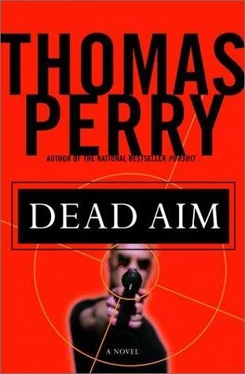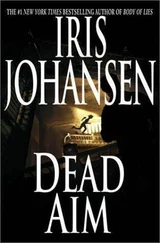Thomas Perry - Dead Aim
Здесь есть возможность читать онлайн «Thomas Perry - Dead Aim» весь текст электронной книги совершенно бесплатно (целиком полную версию без сокращений). В некоторых случаях можно слушать аудио, скачать через торрент в формате fb2 и присутствует краткое содержание. Жанр: Триллер, на английском языке. Описание произведения, (предисловие) а так же отзывы посетителей доступны на портале библиотеки ЛибКат.
- Название:Dead Aim
- Автор:
- Жанр:
- Год:неизвестен
- ISBN:нет данных
- Рейтинг книги:4 / 5. Голосов: 1
-
Избранное:Добавить в избранное
- Отзывы:
-
Ваша оценка:
- 80
- 1
- 2
- 3
- 4
- 5
Dead Aim: краткое содержание, описание и аннотация
Предлагаем к чтению аннотацию, описание, краткое содержание или предисловие (зависит от того, что написал сам автор книги «Dead Aim»). Если вы не нашли необходимую информацию о книге — напишите в комментариях, мы постараемся отыскать её.
Dead Aim — читать онлайн бесплатно полную книгу (весь текст) целиком
Ниже представлен текст книги, разбитый по страницам. Система сохранения места последней прочитанной страницы, позволяет с удобством читать онлайн бесплатно книгу «Dead Aim», без необходимости каждый раз заново искать на чём Вы остановились. Поставьте закладку, и сможете в любой момент перейти на страницу, на которой закончили чтение.
Интервал:
Закладка:
“You think the boyfriend won’t go to the police?”
“Probably not. But if he’s not calling them right now, it doesn’t matter what he does, as long as we don’t leave any prints.”
Debbie nodded. “I’ll go see where she kept her luggage and get started with the packing.”
“Make it real. There will probably be a few cops here the day after tomorrow who will notice if we forget her makeup bag.”
“I know that,” muttered Debbie. She disappeared into the long walk-in closet. Emily could tell that she had not enjoyed killing Mrs. Altberg and was feeling resentful about this evening. Being alone with Debbie made Emily uncomfortable sometimes, but tonight was worse. She was a little bit afraid of her.
They did not speak again until the bag was packed and the bedroom straightened. Then Emily took out her cell phone and dialed Mary’s number.
“Hi,” said Mary.
“Hi,” said Emily. “We’re going to open the gate. When you get here, pull all the way down the driveway to the house, and then turn off your headlights and pop the trunk. Okay?”
“I’ll be there in about five minutes.”
Emily and Debbie lifted the body and carried it down the stairs in the dark, then outside, where they laid it on the grass next to the driveway. Emily went back inside, pressed the remote control to open the gate, picked up the suitcase, and turned off the last of the lights. At the front door she set the lock, pushed the code she had memorized to turn on the alarm, then stepped out and closed the door. She sighed. It was going to be a long drive back to the ranch, and then a couple of hours of digging before this awful day would finally end.
Paul Spangler was packing his belongings when he heard the familiar flat-handed slap on the door jamb that was the military knock. He simply turned the knob so it was unlocked and let it swing open as he turned away and walked back to the bed, where his suitcase lay open.
Parish stepped inside and closed the door, then stood with his back against it. “I wish you wouldn’t do this.”
“I know you do, Michael,” said Spangler. “Thanks for that.” Both men let their voices relax, as they always did when they were alone. The old, natural South African way of pronouncing English words came back, the traces of Afrikaans thicker on Spangler’s tongue and palate than on Parish’s.
Parish said, “The girls will have the whole business cleared away by dawn. There won’t be a trace. They’re like deer, their eyes always open, and their ears twitching. They already feel what you feel about this. They’ll never blame you, or even remind you of it.”
“Nah, old friend,” said Spangler. “I know they wouldn’t. I know you wouldn’t either.” He stepped to his closet, took a handful of hangers with shirts on them, and laid them on the tightly made bed beside the suitcase.
“I’ve made a few bad shots myself, Paul,” Parish said quietly. “You might remember one in Uganda.”
Spangler sat on the bed, both legs stiff and his heels touching the floor. “I remember.” It had been a deep forest patrol along the border between Uganda and Zaire, searching for rebels in a place where all of humanity seemed to have spun off into violent factions, so the problem was not merely sighting groups of armed men but identifying their political affiliations before they opened fire. Spangler had been in command, a captain when Parish was still a lieutenant. That had been when Parish had still been called Eric Watkins, but when Spangler looked back on those times now, Parish always came back to him as Parish. The name Eric Watkins had only been a stage he had passed through.
Parish had been walking point for the patrol, with three soldiers. Spangler had known that Parish would be farther forward than was necessary or advisable in this thick bush, sometimes two or three hundred yards, where if he met resistance the straggling column that Spangler was leading along the jungle track could do little to help him. But when the two had arrived to enlist, Spangler was given the superior rank because he was older, so he did not exercise his nominal authority over Parish unduly. Parish liked adventure, so he could have it. Spangler listened to the sounds of the forest: the calls of birds, buzzing insects, the whispering of billions of leaves and stems-what Spangler thought of as the sounds of heat.
The noises were abruptly replaced by the hammering of an automatic rifle. Before the first burst ended there were others, overlapping. Spangler’s men had already split apart to crouch in the bush on either side of the trail, listening, but Spangler had held his ground. He had instantly identified the shots as Parish’s troops firing their FN FAL paratroop rifles. He waited for answering fire, rounds of a different caliber or automatic fire of a different frequency. The rebels they had encountered in this district had been traveling in gangs of forty or sixty, and when they opened up it was a cacophony of Eastern-made AK-47’s and SKS’s, sometimes a few British or American-made hunting rifles, even a shotgun or two.
He sorted the possibilities, then signaled his men to spread wide and advance toward the sounds. The silence could mean either that Parish’s men had gotten jumpy and opened fire on imagined enemies or that real enemies had ambushed and killed them. Either way, Spangler had to bring his men through the thick vegetation toward the spot.
When they reached a clearing, on the other side he could see Michael Parish and his men standing around looking peculiarly grave. He halted his troops, sent word to maintain their cover, and proceeded alone. Parish met him in the middle of the clearing. “Paul,” he whispered. “It seems we’ve made a slight error.”
“What is it?”
“We heard fairly serious sounds of brush being pushed aside, some branches breaking and all that, so we opened up. It turns out we’ve killed a troop of gorillas.”
“Have you identified what army they belong to?”
Parish leaned closer. “No. Gorillas. Apes. A silverback, about four females, a couple of young ones. Concentrated fire. As long as we saw any bushes moving, we kept it up.”
Spangler had looked around him, over his shoulder, to be sure his men were still in position. “What do your men say?”
“They’re no more eager to let the others know than we are.” He shrugged.
Spangler assessed the situation quickly. He and Parish had come here together and enlisted. They had verified each other’s lies about their former ranks in the South African army and their time in service. Their troops were not all volunteers, and the ones who were tended to be the sort who couldn’t return to their villages. If he and Parish allowed these men to believe their two officers were buffoons, their lives would be in danger.
Spangler said, “How about this? You caught some poachers in the act. You fired on them and chased them off.”
“It’s the best we can do.”
“Then I’ll go and brief the noncoms while you talk to your men and get the story straight.”
Spangler had been especially long-winded in his briefing, then posted pickets and gave his men a rest to allow Parish and his men the time to mutilate the gorillas’ bodies a bit with knives. By the time the main column was allowed to advance to the spot, it appeared that the animals had been butchered for the lucrative trade in their hands and feet. Since the missing parts were not to be found anywhere, it was clear that the poachers must have gotten what they wanted before their escape.
Many years had passed since that day in the forest. Spangler marveled at the way looking at Parish and listening to his voice seemed to bring it all back in absolute clarity.
“We’ve been in some scrapes,” Parish said. That was the other part of the story, and Parish needed to say nothing more to trigger Spangler’s emotion. They had been in battle together.
Читать дальшеИнтервал:
Закладка:
Похожие книги на «Dead Aim»
Представляем Вашему вниманию похожие книги на «Dead Aim» списком для выбора. Мы отобрали схожую по названию и смыслу литературу в надежде предоставить читателям больше вариантов отыскать новые, интересные, ещё непрочитанные произведения.
Обсуждение, отзывы о книге «Dead Aim» и просто собственные мнения читателей. Оставьте ваши комментарии, напишите, что Вы думаете о произведении, его смысле или главных героях. Укажите что конкретно понравилось, а что нет, и почему Вы так считаете.












